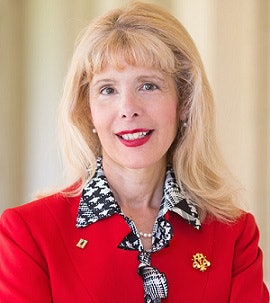Driven by an institutional mission of social responsibility, Dr. Leticia M. Diaz oversees a law school rich with diversity and strength in its commitment to utilizing legal knowledge for greater good.
Before entering law school in the early 1990s, Diaz had already earned a doctorate in organic chemistry. At the time, her goal was to become a patent attorney, but once she started teaching at a law school, she fell in love with legal education.
 Dr. Leticia M. Diaz
Dr. Leticia M. Diaz“I found that my true passion was educating future lawyers,” says Diaz, dean of the Barry University Dwayne O. Andreas School of Law. “That decision is reinforced every time graduates return to thank me for what they learned under my tutelage.”
Barry University was founded in 1940 by the Adrian Dominican Sisters. The School of Law, established in 1999, is the first American law school to be part of a university founded by religious women. While it embraces a Catholic Dominican tradition, the School of Law values religious and academic freedom. The program endeavors to equip graduates with values and skills that benefit society.
Diaz was one of the founding faculty and was appointed dean in 2007. Taking on a larger leadership role enabled her to fulfill many of her goals, one of which was to increase diversity in the legal profession. During her years as dean, minority enrollment has significantly increased. Much of that can be attributed to an increase in recruitment and retention of traditionally underrepresented groups in order to create a more diverse faculty, staff and student body.
“We have annual targeted recruiting efforts at historically Black colleges and universities, as well as focused admissions initiatives with a priority of recruiting, training and developing the future leaders of Hispanic, African-American and every minority group that is traditionally underrepresented and underserved in the legal profession,” says Diaz.
The School of Law is involved with the Council on Legal Education Opportunity and is working toward developing articulation agreements with HBCU’s that would increase the educational opportunities for minority students at those institutions while containing costs.
“We are among the list of law schools with the most diverse student bodies,” Diaz says. “Prospective students are attracted by the racial, ethnic, cultural and professional diversity that exists among the students and faculty within our law school community.”
There are also distinct opportunities to engage in social justice work through three centers opened since Diaz has been dean: the Juvenile Defense Clinic, the Bankruptcy Clinic and the Center for Earth Jurisprudence. In the aftermath of Hurricane Irma in 2017, the law school community came together to assist people whose lives were severely impacted.
There is also an Immigration Clinic that advocates for those unable to afford legal representation and provides support in areas such as legal and factual research for lawyers who are working on cases.
“We’re continuing to fight for reunification for all of our clients who are separated from their children and families after fleeing persecution and other violence,” says Diaz. “We have done two presentations this past year to the broader university community regarding our clinical and outreach programs. Immigration was certainly one of the prominently highlighted issues. Our director does a fantastic job of personalizing the issues confronted in immigration cases.”
Diaz occasionally teaches courses on environmental law and environmental justice. Both topics involve science and underrepresented populations that are often exposed to toxic substances. She feels it is important that students understand that legislation is needed to protect society from increasing environmental harms.
As a Cuban-American woman, Diaz feels a duty to serve as a role model and mentor. She also tries to inspire young people to give back to their communities — speaking with groups of students and sharing her journey through law school.
The goal is for all students to leave the School of Law as highly educated, ethical attorneys who will continue to carry out the school’s mission. Students are required to earn six professional enhancement credits as a graduation requirement. At least one of those credits must be earned through participation in a cultural competency-approved program or event, focused on the importance of building an inclusive community. There is a collaborative mindset rooted in interdependence, dignity, equality, compassion and respect for all.
“I’d like to ensure that our current clinical programs not only continue to help our community with legal issues, but we would also like to explore expanding our clinical programs to include other important areas in line with our mission,” Diaz says. “An elder law clinic would fall in line with our mission and help our senior community members who need legal assistance.
“I do hope that students leave here embracing our emphasis on serving others, highest ethical values, embracing and not just tolerating diversity,” she adds. “By accomplishing all this and more, I hope we have set an example to everyone in the legal profession.”
This article appeared in the July 12 issue of Diverse. It is one in a series of stories about law school deans.





















